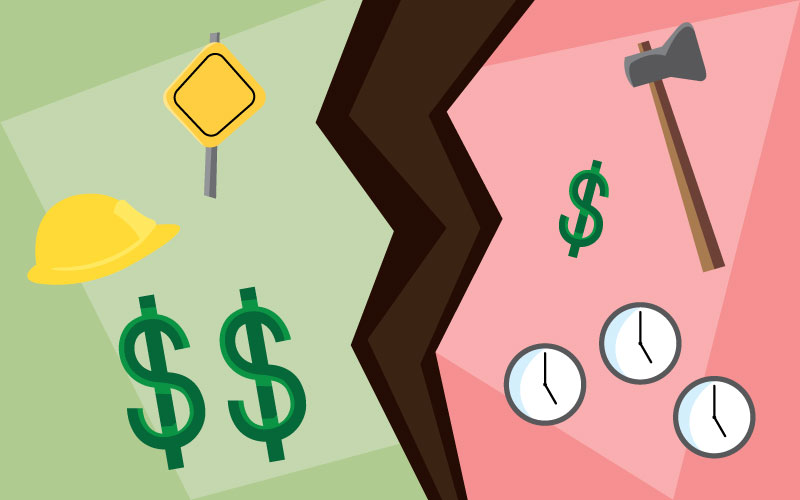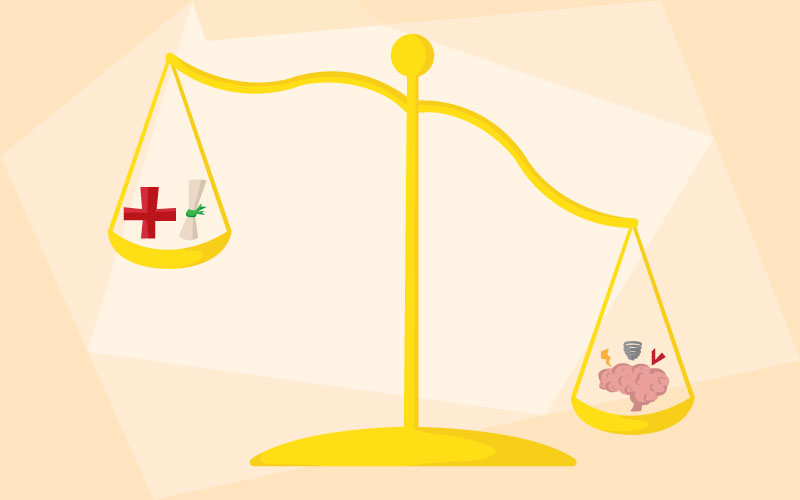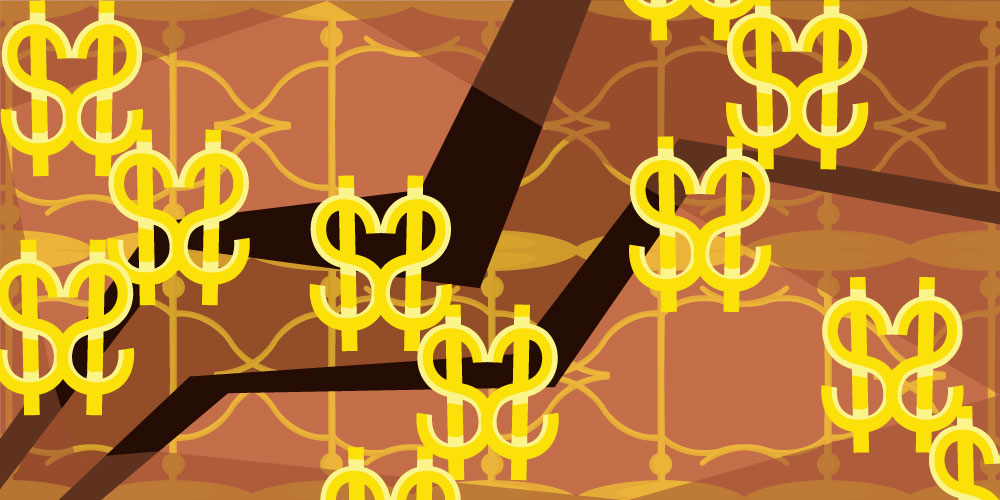“We’re basically fucked, unless we un-fuck ourselves, systematically and collectively,” presidential hopeful Andrew Yang told Politico this summer. Currently polling at five percent, Yang has resonated with high school residents in Iowa; Black residents of Flint, Michigan; and Trump voters in South Carolina who recognize the loss of jobs to automation, growing insecurity, and related depression and addiction that he describes. People respond, too, to his proposal of a guaranteed income – $1,000 a month for every adult – as something that would directly and materially improve their lives.
While the Democratic candidates talk much about the disruption of existing industries and the demand for public healthcare and other non-employer-based benefits, Yang stands out in his focus on the societal effects of economic insecurity. He likes to quote the statistic that persistent poverty lowers a person’s IQ by 13 points, and makes the connection between economic insecurity and suicide, depression, and opioid addiction.
That focus is crucial. To successfully tackle the problems the candidates lament, we must identify the tides in individual and social conditions we want to stem, and what our society would look like if we’re unsuccessful in that effort.
Work is the central activity to which we ascribe economic value. If its economic valuation is high, it provides people with security, a way of mitigating the risk that their basic needs will not be met. Security enables people to build things of personal and social value, in relationships, communities, and non-compensated activities. It enables autonomy and power, and an ability to invest in the future. Lack of security leaves people vulnerable and with limited ability to build lives of their own.
A small but growing body of research looks at the effects of precarious employment on how people function in the world. For a long time, sociological research on health has focused on genetics and lifestyle, and if it’s looked at the health effects of economic relations at all, it’s narrowly addressed physical risks. Recently, however, a few sociologists have begun to measure instability and vulnerability in employment conditions and the effects of those conditions on mental health, personal choices, and social relations.
At the same time, other research is considering the effects of individual insecurity and stress on the ability of people to escape poverty, think about and plan for the future, and adapt to change. Although these nascent areas of study have been largely developed separately, together they begin to give us a clearer sense of the individual and social lives that many people already lead. In that, they also help us understand what is alarming about a not-too-distant future in which more and more people could lead those lives.
Understanding the individual and social effects of precarious employment is pressing. After having declined in Europe and North America, it has been on the rise in the past thirty plus years. The increase in corporate sub-contracting of all but the most core business activities, the decline of industries with a history of labor organizing and a model of well-paid, secure employment, and the resultant gap between labor regulations and the way labor is actually structured have made more jobs more unstable in terms of hours, wages, conditions, and worker protections and power.

In his book The Fissured Workplace, David Weil describes this restive capital and information technology-driven shedding of employment from large companies to small companies or independent contractors. Those trends, Weil asserts, have created “downward pressure on wages and benefits, murkiness about who bears responsibility for work conditions, and increased likelihood that basic labor standards will be violated.” In many cases, “fissuring leads simultaneously to a rise in profitability for the lead companies who operate at the top of industries and increasingly precarious working conditions for workers at lower levels.”
Precarious employment is defined in terms of the relationship that an employee has to the employer, according to Joan Benach, director of the Barcelona-based Health Inequalities Research Group, Carles Muntaner, Co-chair of the World Health Organization’s Employment Conditions Knowledge Network, and the Poverty and Employment Precarity in Southern Ontario (PEPSO) project. Workers in precarious jobs have little to no power, which means no control over their wages, benefits, and conditions of employment. They are, therefore, more vulnerable to fluctuations in the market and increasingly unable to support themselves and their families.
While other research has focused on particular aspects of employment precariousness, the European and Canadian research groups take a multidimensional approach, identifying and measuring the conditions and power relations – employment instability, low wages, vulnerability towards undesirable treatment, among others – that make workers vulnerable, in an effort to more fully understand the effects of precarious employment on health and well-being.
Formative research from Benach’s group suggests that precarious workers have worse self-reported physical health, poorer mental health, including increased depression and stress, and an increased risk of occupational injuries and exposure to hazardous working conditions. The PEPSO research finds that employment precarity is not strongly associated with general health, but is associated with poorer mental health. Wayne Lewchuk, professor of global labor issues at McMaster University in Canada, summarizes this research as indicative of two big effects of precarious work. First, powerlessness at work and lack of training means that precarious workers engage in more hazardous work. And, second, lack of employment security is itself a hazard, in the way that it leads to heightened stress and mental health effects. As Lewchuk put it to me, the “uncertainties pile up and at some point you break.”
The hazards of employment insecurity extend beyond individual health and mental health to family and social relations. In addition to the negative effects that anxiety over employment and uncertain work schedules have on personal and family life, the PEPSO research indicates that workers in precarious employment delay starting personal relationships and having children. Precarious workers are five times more likely to have delayed forming a relationship than workers with secure employment, and are more than twice as likely to have delayed having children when compared to high-income workers in secure employment.
High levels of stress associated with economic insecurity can also make it more difficult to escape poverty. In Happiness for All? US public policy researcher Carol Graham discusses how people whose high stress levels are associated with daily struggles exhibit an inability to plan and disproportionately value today’s income over tomorrow’s, with the result that they don’t make investments in the future in the form of health or education. Graham’s research suggests the kind of stress that people living in poverty commonly experience, which is related to daily struggles and circumstances over which they have little or no control, has more negative effects than the kind of stress that wealthier and better educated people experience, which is associated with goal achievement. Those effects, she points out, are less “markers of material deprivation and more markers of inability to take up opportunities and exit poverty.”

What role material and psychological security plays in people’s lives is the question at the heart of all these inquiries. In Marianne Cooper’s study of families in Silicon Valley Cut Adrift, she documents “how people cope with insecurity, how they manage their anxiety, whose job it is to worry, and how social class shapes all of these dynamics, including what is even worth worrying about in the first place.” In that, she looks at security as something people create, perform, and work toward in their daily lives. She observes that more affluent families “upscale” what they need to feel secure, reaching for ever-higher retirement and educational savings, and less well-off families “downscale” what they need, focusing on present achievements like being able to put food on the table and pay the month’s rent.
Downscaling is when “those who are struggling economically submerge certain emotions and bring forth others in order to control their anxiety over difficult or precarious circumstances.” Building on Arlie Russell Hochschild’s “sociology of emotions,” Cooper looks at how power “works through feelings, typically raising the expectations of the more powerful and lowering the expectations of the less powerful.” She sees in the way that people with precarious lives manage their emotions a reflection and reproduction of larger social and economic structures. People must diminish their expectations to survive emotionally and psychologically, but that also perpetuates social inequities.
Seeking to combat the effects of diminished expectations, Hawthorne Smith, director of the Bellevue/NYU Program for Survivors of Torture, works with people from all over the world who have come as refugees or asylum seekers to New York. His patients’ ability to find a sense of security in their new environment, he stressed to me, is central to their ability to heal from the trauma they’ve experienced. A majority of those people begin their new lives in precarious jobs, which often represents a professional and social devaluation. To achieve greater security, they must either find employment that provides sufficient financial stability to enable a life beyond basic survival, or create sources of “psychological and emotional meaning-making” beyond the immediate circumstances of their employment.
For the most successful of the program’s participants, Smith explained, that meaning-making involves the recognition that the challenges they’re currently facing are small compared to those they’ve come through. It also involves asserting control over the effect that circumstances have on character – that through difficult circumstances people can hold on to the aspects of their selves that matter to them, and create meaning from that in the present and for the future.

That focus on adaptation also recognizes that poverty can permanently change people’s brains and bodies, in addition to diminishing their cognitive functioning (including IQ) in times of stress. A group of North American medical researchers has shown how lower socio-economic status can negatively affect brain development and function, and therefore also impact the regulation of the body’s systems. Their work studies the way in which a whole range of environmental factors, including chronic stress and conditions associated with precarious work and poverty, can lead to progressive regulatory breakdown in the body. This results in cumulative wear and tear that erodes physiological health, including cognitive functioning.
A paper on this subject invokes Hans Selye, a mid-twentieth century endocrinologist who worked on responses to stressors and explained that “life is largely a process of adaptation to the circumstances in which we exist…the secret of health and happiness lies in successful adjustment to the ever-changing conditions on this globe; the penalties of failure in this great process of adaptation are disease and unhappiness.” In the words of the paper’s authors, the current research on cumulative physiological wear and tear is “an index of the relative degree of ‘failure’ at a physiological level—i.e., a marker of the cumulative, physiologic costs of previous efforts to cope with life’s slings and arrows.”
The ability to cope with life’s slings and arrows is what Benach seeks in pushing us to understand health as “a way of living.” It’s connected to our autonomy and, in that, a social and political thing. Guy Standing, professor of development studies at the School of Oriental and African Studies, considers the implications of that in his book The Precariat: The New Dangerous Class. He argues that to be “precariatised” is to be subjected to “living in the present, without a secure identity or sense of development achieved through work and lifestyle.” That short-termism, Standing speculates, not only has implications for individual life and career-building, but could also become “a mass incapacity to think long term,” posing a danger to sustained social and political participation.
A society in which people are unable to project into the future and build on the past – individually, with friends and family, and as part of a broader community – is hardly a society at all. At best, it’s a world in which only a small group of people have the security and, thereby, power to form social relations and make decisions about how we live together. We need to confront that – in how we use technology to shape our lives, and what industry disruption and automation do and might mean. If an increasing number of people are cut off from sources of personal development and collective engagement, including the ability to form ideas and adapt to changing conditions, we risk destroying not just individual lives, but also any societal foundation for building our way into a not-completely-devastating future. •




